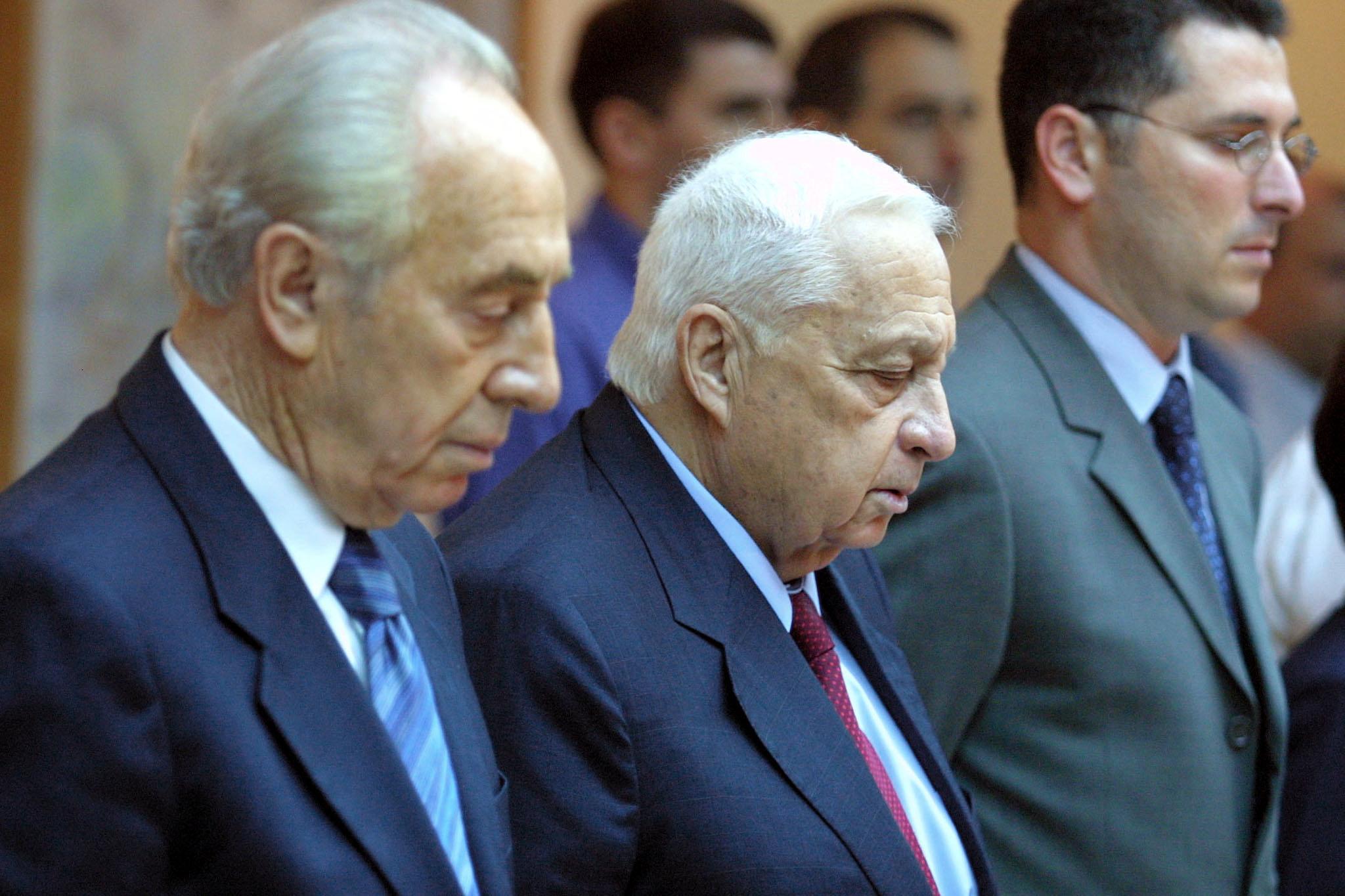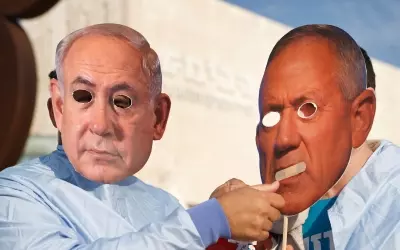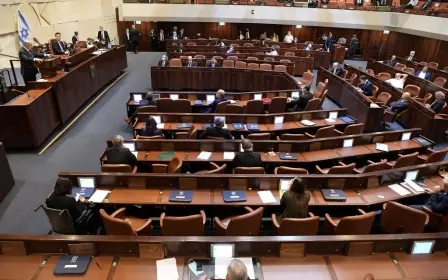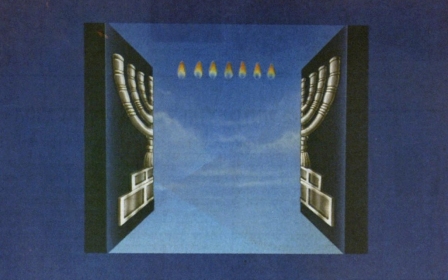Gideon Saar: The right-winger who could unseat Netanyahu and remake Israel

As foreseen, Israel's parliament did not extend the deadline for the government's adoption of its next budget, triggering its automatic dissolution. At the end of March 2021, Israelis will be voting again, in the fourth national election in under two years.
This lack of political stability results from many factors, most notably Israel's "democratic deficit" - the fact that the country is unable to accept the Palestinian minority of its citizens as a legitimate part of its political entity, its polity.
The Israeli polity is built on a (Jewish) ethnic foundation, rather than on its entire citizenry (the demos).
This is the main reason why, when the rightist camp under Prime Minister Benjamin Netanyahu failed to achieve a majority in the three rounds of elections between April 2019 and March 2020, the opposing camp was unable to assemble a government.
In American terms, the equivalent would be as if Donald Trump lost but Joe Biden failed to be elected. And this is before we even begin talking about the Palestinians living under occupation in the West Bank and Gaza Strip.
But the immediate reason for the early elections is the fact that large parts of the Israeli public no longer see Netanyahu's leadership as legitimate. The indictments against him are one major factor, combined with his comprehensive attacks on government institutions and his problematic management of the Covid-19 crisis.
A long series of demonstrations against Netanyahu, starting six months ago and ongoing, has only reinforced his illegitimacy. Had there been no such demonstrations, Benny Gantz's Blue and White would likely have managed somehow to continue supporting Netanyahu despite the party's repeated humiliation by the prime minister.
The serial demonstrations shrank the defence minister's room for manoeuvre and finally led to the fall of the government.
And yet, if the latest opinion polls are to be believed, the centre-left will gain nothing from Netanyahu's failure to keep his government intact. Instead, parties on or affiliated with the right are expected to end up with 75 to 80 of the 120 seats in Israel's parliament - an unprecedented achievement.
The main beneficiary of this chain of events is Gideon Saar, a Likud MP who quit the party two weeks ago and announced the formation of his New Hope party.
Although the bad blood between Saar and Netanyahu is common knowledge, his exit from Likud and public commitment not to sit in a government under the premier was unexpected. Recent polling gives his party a probable 19 seats, meaning that if Saar keeps his promise not to serve with Netanyahu, the latter's chances of forming a new government are exceedingly slim.
Hardline policy
Despite being somewhat unknown internationally, Saar is a very familiar figure in Israeli politics, even though he is relatively youthful at 54.
He came of age in Tehiya ("Revival"), a far-right party that emerged from the opposition to Israel's withdrawal from the Sinai Peninsula under the peace accord signed by the government of Menachem Begin with Egyptian president Anwar Sadat in 1979.
Saar later became a political reporter, nearly the only right-wing journalist in left-leaning newspapers, and was later interned as an aide to the attorney-general before entering politics directly. Netanyahu, during his first term as prime minister in 1999, made Saar his cabinet secretary, a position with substantial influence on the day-to-day workings of the administration.
Sharon appointed him to the same position when Likud returned to power in 2001. Saar was first elected to Israel's parliament, the Knesset, in 2003. After Netanyahu returned to power in 2009, he appointed Saar to two key positions in his subsequent administrations - education minister and interior minister.
Saar has been identified, throughout his political career, with the right wing of the Likud.
When Sharon announced a withdrawal plan that meant evacuating Israeli settlements from the Gaza Strip in 2005, Saar was a leading opposition voice and he voted against the plan in the Knesset.
After Netanyahu first acknowledged the possibility of a Palestinian state in his "Bar Ilan speech" of 2009, Saar was forthright in his criticism. In the same vein, as consistently as ever, Saar opposed Trump's "deal of the century" because it included the establishment of a Palestinian state, albeit under very restrictive conditions and without territorial continuity or control over its external borders.
Warnings from many on the radical left urge caution regarding Saar's moderate image. They claim it is illusory and that, once in power, he will be much worse than Netanyahu
As education minister, Saar launched an initiative to send high school students in secular public schools on tours of the West Bank city of Hebron, where Israelis have settled illegally under fierce military protection.
He also spearheaded the recognition of Ariel College as a university, despite its location in a settlement right in the heart of the West Bank. He remained undeterred when the Council for Higher Education in Israel opposed the move due to a fear of the political repercussions of bestowing official legitimacy on a university in the occupied territories, and one with less than impressive academic credentials, at that.
At the interior ministry, Saar instituted a hardline policy toward asylum seekers from Africa. Thousands were sent to an isolated detention camp newly constructed in Israel's south.
After the Supreme Court twice invalidated the law permitting incarceration of asylum seekers without trial, as a violation of fundamental human rights, Saar pushed for new legislation to allow Israel's parliament to circumvent the rulings.
A typical right winger
Saar's demand for "reforms" in the judiciary, a euphemism for diluting the power of judges and enhancing the power of politicians, are among the basic tenets of the new party he founded - along with "realising the natural and historical rights of the Jewish people in Israel" and encouraging settlements in the West Bank.
In other words, while Netanyahu's positions changed and changed again, Saar was and remains a typical right-winger.
Unyielding though he may be, Saar enjoys support from voters of the centre and even the Jewish left, where Netanyahu has become a pariah.
Polls reveal that at least half his voters previously supported Blue and White or centre-left parties. Moreover, he lives in Tel Aviv, long a bastion of the centre-left, while Netanyahu lives in right-leaning Jerusalem. Saar also has excellent connections with upper-echelon journalists, whereas Netanyahu's relations with the media have always been thorny.
But that's not the whole story. While Netanyahu in recent years has harshly attacked the "deep state" in the manner of Trump, Saar has always preserved the dignity of government institutions and criticized Netanyahu's attacks on the judiciary. He presents himself as a conservative democrat, more aligned with the pre-Trump Republican party than with the wild style of the outgoing US president.
Even when attacking the left, Saar's language remains much more moderate than the incitement from Netanyahu. You won't hear Saar calling demonstrators in Jerusalem "spreaders of disease" or warning against "hordes" of Palestinian citizens "flooding the polls by the busload". After the madness of Netanyahu, Saar represents a kind of return to normalcy.
Warnings from many on the radical left urge caution regarding Saar's moderate image. They claim it is illusory and that, once in power, he will be much worse than Netanyahu, not just on the occupation and annexation but also in terms of the rule of law.
They say that where Netanyahu hesitated, fearing to launch any major military confrontations, Saar's policies would be much more violent. We may yet find ourselves missing Netanyahu, warn those on the far left.
Only if Saar can actually assemble a government will we learn how accurate those warnings were. But things could well turn out differently.
If he keeps his promise not to join a government under Netanyahu (and thus far he has shown himself to be relatively reliable, for a politician), the only course left to him to form an administration would be a coalition with center-left parties, perhaps even including Meretz from the more radical Jewish left.
His freedom of action would be limited, unlike the government Netanyahu led prior to the 2019 election, which included only right-wing parties and adopted the nation-state law and other legislation clearly discriminatory toward Palestinians both within Israel and in the occupied territories.
A positive change?
But even if Saar sticks to his solidly right-wing positions, there might be one positive change compared with Netanyahu.
Netanyahu is so much more ideologically elusive - today he promotes annexation, and tomorrow will be espousing peace with the whole Middle East; today he delivers a Bar Ilan speech, and tomorrow will be promising that during his tenure no Palestinian state will be established; today he incites against the "gluttonous" public sector and tomorrow will be handing out coronavirus-era gifts of government money.
All of which makes it much more difficult to have an ideological debate with Netanyahu. He makes any argument with him a personal one. Disagree with him, you're the enemy; support him, you're a saint.
Conducting such an argument would be much easier with Saar, especially about the future of Israel's relations with the Palestinians. Since his opposition to a Palestinian state is quite clear, it should be possible to return to discussing the "big" questions of the Israeli-Palestinian conflict, questions that were muffled during Netanyahu's time precisely because he made everything personal.
With Biden entering the White House, the possibility of a return to real negotiations with the Palestinians may well make it to the table
This change may become relevant given that, with Biden entering the White House, the possibility of a return to real negotiations with the Palestinians may well make it to the table.
There are also other things, not directly related to the election results.
Anti-Netanyahu protests have drawn tens of thousands of people to the streets repeatedly for months. This has created a new political awareness among large chunks of the Jewish centre-left, including a willingness to challenge the Israeli regime from within, perhaps unprecedented in scope.
Even if the right wins the March election, which at this point appears to be the most likely outcome, the Israeli street may not remain as indifferent as it was during Netanyahu's long reign.
After 12 straight years of Netanyahu, Israel without him will be very different than Israel has been with him. Things were bad with Netanyahu. There is certainly a chance that without him, things will be better.
This article is available in French on Middle East Eye French edition.
Middle East Eye propose une couverture et une analyse indépendantes et incomparables du Moyen-Orient, de l’Afrique du Nord et d’autres régions du monde. Pour en savoir plus sur la reprise de ce contenu et les frais qui s’appliquent, veuillez remplir ce formulaire [en anglais]. Pour en savoir plus sur MEE, cliquez ici [en anglais].







